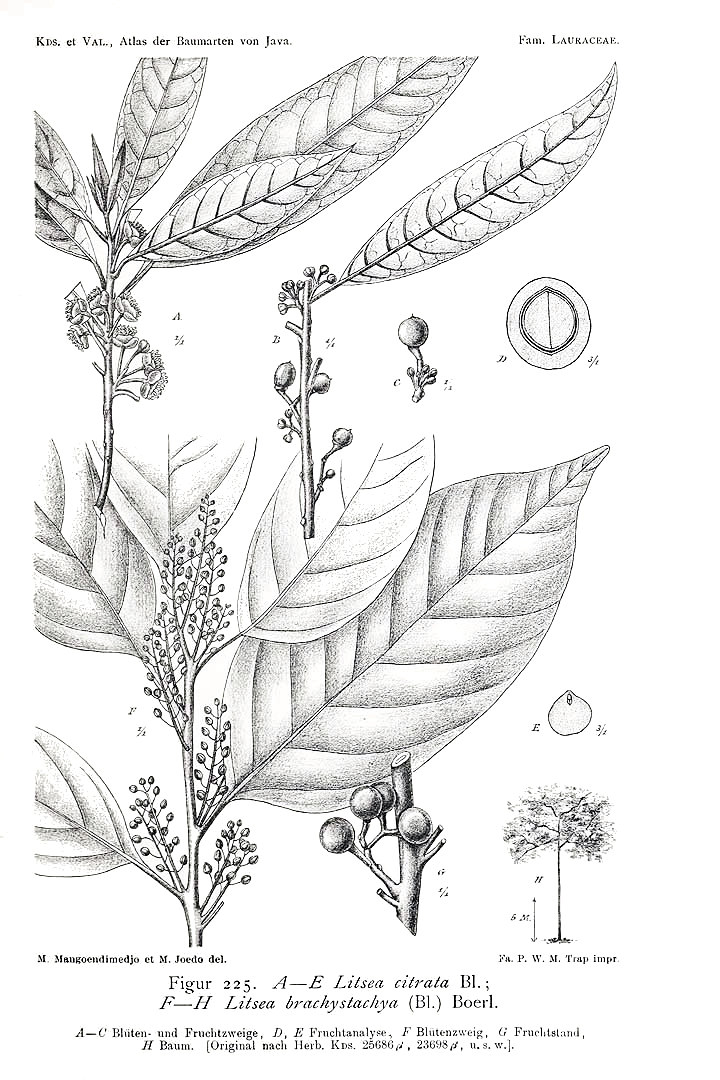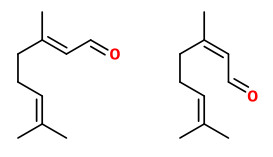Litsea cubeba (Lour.) Pers. - Lauraceae - syn.Laurus cubeba Lour. - 山鸡椒 shan ji jiao, mountain pepper, aromatic litsea, may chang
Evergreen shrub or small tree, 8-10 m tall, native to South East Asia (China to Indonesia; Taiwan also: var.formosana = Aperula formosana Nakai); leaves alternate, flowering before leaves or with leaves; umbels solitary or clustered, 4-6-flowered, male flowers with 6 perianth segments; fertile stamens 9; fruit pepper-like subglobose, 5 mm in diam., mature black. http://www.efloras.org/florataxon.aspx?flora_id=2&taxon_id=200008831
Litsea cubeba oil, distilled from the fruits (3-4.5%), contains mainly citral.
„Its major use, however, both in the People's Republic of China and in international markets, is as a raw material source for the isolation of citral. This is used in its own right for flavour and fragrance purposes or converted by the chemical industry to a number of important derivatives such as ionones, which possess a violet-like fragrance, and vitamins.“ FAO (archived; retrieved 20251106)
„The major components in the oils from roots and fruits, from stems, leaves, and alabastra, and from flowers were citral B (neral), β-phellandrene, and β-terpinene, respectively.“
[Chemical composition and antibacterial activity of essential oils from different parts of Litsea cubeba. Wang, H., & Liu, Y., Chemistry & biodiversity, Vol.7(1), 2010, 229-235]
„The chemical composition of essential oils of L. cubeba (EOLC) were determined for fruits harvested from eight regions in China. The overall essential oil content, obtained by hydrodistillation and analyzed by gas chromatography-mass spectrometry (GC-MS), ranged from 3.04% to 4.56%. In total, 59 compounds were identified, the dominant components being monoterpenes (94.4-98.4%), represented mainly by neral and geranial (78.7-87.4%). D-Limonene was unexpectedly a lesser constituent (0.7-5.3%) in fruits, which differed from previous reports (6.0-14.6%). Several components were only detected in certain regions and compounds such as o-cymene and eremophilene have never before been reported in EOLC. These results demonstrate significant regional variation in the chemical composition of EOLC.“
[Chemical composition of essential oils of Litsea cubeba harvested from its distribution areas in China. Si, L., Chen, Y., Han, X., Zhan, Z., Tian, S., Cui, Q., & Wang, Y., Molecules, Vol.17(6), 2012, 7057-7066]
PDF
Litsea cubeba oil „… demonstrated a strong irritant and repellent activity on a laboratory-reared colony of
Ae. aegypti as indicated by the rapid escape time from chambers.“
[Excito-repellency properties of essential oils from Melaleuca leucadendron L., Litsea cubeba (Lour.) Persoon, and Litsea salicifolia (Nees) on Aedes aegypti (L.) mosquitoes. Noosidum, A., Prabaripai, A., Chareonviriyaphap, T., Chandrapatya, A., Journal of Vector Ecology, Vol.33(2), 2008, 305-312]

Litsea cubeba (Lour.) Pers. as Litsea citrata Blume; Koorders, S.H., Valeton, T., Atlas der Baumarten von Java, vol.2,
p. tro-17800835, t.225, fig. A-E (1914) [M. Mangoendimedjo & M. Joedo] plantillustrations.org

Litsea cubeba, Nantou, Taiwan (2025) © 藪山 CC BY-SA 4.0 inaturalist.org


